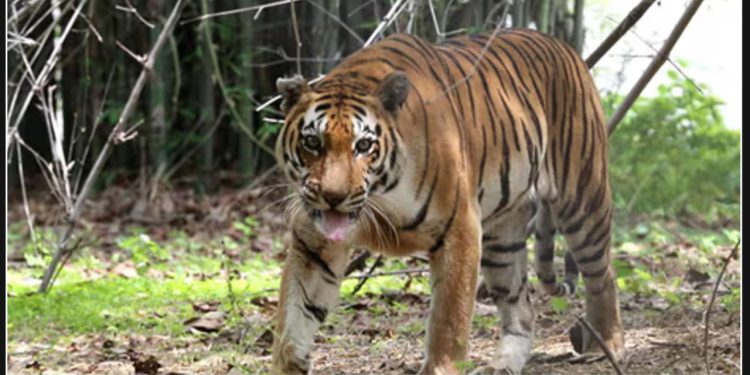Twenty exotic cats, including a Bengal tiger, four cougars, a lynx, and four bobcats, succumbed to bird flu after contracting the virus at an animal sanctuary in Shelton, Washington.
Bird flu, a highly pathogenic avian influenza, has rapidly spread through poultry flocks and dairy herds in the US. This outbreak has not only infected and killed domestic cats but has also caused a severe illness in a person in Louisiana.
According to Mark Mathews, the director of the Wild Felid Advocacy Center, the cats passed away during the period from late November to mid-December.
According to Mathews, the New York Times reported that they have never witnessed anything like this before. Typically, the birds die naturally from old age. However, this virus seems to be particularly dangerous. Mathews described it as a “pretty wicked virus.”
Three additional cats have successfully overcome the virus, while one cat is still in critical condition as of Tuesday. The center took to Facebook last week to inform the public that over fifty percent of their wild felines had been impacted by avian flu.
Less than three weeks later, the center announced its temporary closure to the public due to an unknown illness affecting some of the animals.
The shelter posted on Facebook, stating that they are actively collaborating with their veterinary team to investigate the cause and find a resolution.
On December 6th, the center made an announcement confirming the presence of bird flu in some of its cats. They stated that they are collaborating with federal, state, and county animal health officials to address the issue.
The animal sanctuary ensures efficient virus management through the implementation of stringent biosecurity measures. Affected animals are quarantined, and thorough disinfection is conducted to safeguard the health of other animals and the general public.
In a recent Facebook post, the center shared heartbreaking news about the presence of highly pathogenic avian influenza (HPAI) among over half of their wild felids as of December 2024. Animal health officials have confirmed this devastating development.
Bird flu can also infect carnivorous mammals that consume infected birds or their products, according to the center.
According to a statement, cats are highly susceptible to this virus. It can initially present with mild symptoms, but it can progress rapidly and lead to death within 24 hours due to pneumonia-like conditions. The statement also mentioned that the center is currently under quarantine and will remain closed to the public until further notice.
The sanctuary is currently investigating the origin of the virus and has taken several steps to ensure the safety of the remaining 17 cats. This includes removing 8,000lb of food stored in a freezer and thoroughly disinfecting each habitat.
The prices of eggs are skyrocketing due to the devastating impact of bird flu on the US hen flock.
The Washington Department of Fish and Wildlife has stated that they have confirmed cases of avian influenza in multiple wild birds this autumn. Additionally, they have recently confirmed that two cougars in a different region have been infected with the H5N1 virus.
An Oregon house cat has died after consuming pet food contaminated with bird flu, according to Oregon authorities. This incident has led to the recall of raw frozen pet food sold nationwide. Northwest Naturals, a pet food company based in Portland, Oregon, voluntarily recalled one batch of its two-pound Feline Turkey Recipe raw frozen pet food after it tested positive for the virus. The affected product was distributed through various channels in Arizona, California, Colorado, Florida, Georgia, Illinois, Maryland, Michigan, Minnesota, Pennsylvania, Rhode Island, and Wisconsin, as well as in Canada’s British Columbia.
Dr. Ryan Scholz, the state veterinarian at the Oregon Department of Agriculture, stated in a news release on Tuesday, “We are confident that this cat contracted H5N1 by consuming the Northwest Naturals raw and frozen pet food. This cat was strictly an indoor cat and was not exposed to the virus in its environment. Results from the genome sequencing confirmed that the virus found in the raw pet food and the infected cat were identical.”
This unfortunate incident highlights the importance of ensuring the safety of pet food and the potential risks associated with contaminated products. It serves as a reminder for pet owners to be cautious and vigilant when choosing and handling pet food.
No human cases of bird flu have been connected to the incident, but Oregon authorities are closely monitoring individuals who came into contact with the cat for any signs of flu symptoms.
A week ago, health officials in Los Angeles announced that they were looking into three household cats suspected to have contracted bird flu. This comes as two other cats were confirmed to have the disease after consuming recalled raw milk and subsequently passing away.
Earlier this year, a Texas dairy experienced a devastating incident where 12 barn cats tragically lost their lives after consuming contaminated raw milk.
Bird flu has ravaged the majority of California’s dairy cattle herds this year, as evidenced by the infection of cows in 645 dairies with H5N1. The United States has already seen 61 reported cases of human infection, although the majority of individuals have only experienced mild symptoms.
